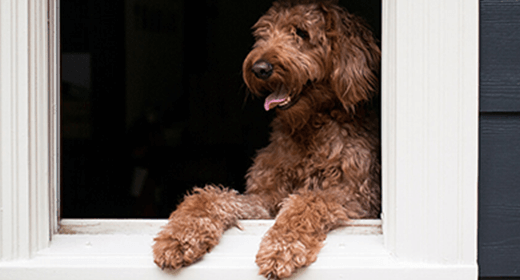

Nutrition and bodyweight management are crucial for the health of a pregnant dog and her puppies. While your dog may not require as many doctor visits as people do during pregnancy, you will still need to understand how to take care of a pregnant dog. This can be achieved by consulting your vet who can evaluate and treat her for both internal and external parasites that could pose a threat to her or her offspring. Pregnancy in a dog is one of the most exciting, yet delicate times in the life of a female dog. Hence, providing sufficient care during the early weeks of pregnancy is critical.
Pregnancy in a dog is one of the most exciting, but delicate, times in the life of a female dog and her unborn puppies. As a result, providing sufficient care during the early weeks of pregnancy is critical.
Here are a few signs that will tell you if your dog is pregnant –
It can be difficult to notice anything unusual in your dog during the first few weeks of her pregnancy. However, you can watch out for subtle signs of pregnancy in dogs.
Reduced activity
Your pregnant dog will get tired easily and spend more time napping. For dogs that usually have a high energy drive, this decrease in activity should be considered carefully. It may be difficult to spot a decline in energy in dogs who love resting all day. So, if this is the case, take pay attention to how quickly she feels wearied on walks.
Strange behavior
You will observe certain changes in your dog's behaviour if she is pregnant. For example, she may crave her owner's comfort more frequently. A pregnant dog will spend more time around you, seeking extra attention. At times, she will also prefer solitude and would not want to be bothered. And when given attention, she may appear depressed or even irritated.
Alterations in appetite
Appetite fluctuations are another sign of pregnancy in dogs. She may eat less and even vomit on occasion, early or midway through the pregnancy. However, she may consume more than normal and be unhappy with her meals. These changes are caused by your dog's shifting hormones.
Weight gain and belly enlargement
Your dog's abdomen will grow in size as the puppies grow. This can be one of the most obvious signs of a dog's pregnancy, particularly if your dog hasn't gained weight for any other reason. However, because enlargement of the abdomen happens late in a dog's pregnancy, and if you detect this sign, it’s time to take her to the clinic.
Proper nutrition for pregnant dogs is important in this period. Therefore, extra caution and care should be given while providing food for pregnant dogs and caring for them.
Pregnancy and nursing are not only responsible for many changes in a dog's body, but for changes in her lifestyle as well. If your dog is pregnant or nursing, pay special attention to her changing nutritional needs as she carries, delivers, and nurses her puppies.
| Weeks 1 and 2 |
|
| Weeks 3 and 4 |
|
Weeks 5 and 6 |
|
Weeks 7 and 8 |
|
Week 9 |
|
Before dog pregnancy
There are certain vaccines that you should consider giving your dog before she’s pregnant.
The Canine Task Force of the American Animal Hospital Association believes the following canine immunisations to be essential:
During dog pregnancy
In general, normal pet owners will not need to vaccinate a pregnant female dog. If she is up to date with all her vaccinations, there is usually no need to give her an additional booster shot just because she is pregnant. Moreover, even veterinarians discourage vaccinating pregnant dogs.
The nutritional requirement for large-breed dogs differs from that of small-breed dogs. While you would want to shower your pregnant dog with endless foods and treats, it is best to refrain from it. Overfeeding could lead to obesity towards the end of pregnancy. This will increase the risk of difficult labour, which will thereby cause stress to the dog. Hence, during these delicate times, following the feeding guide provided by your vet is a must.
A small breed dog needs more calories per pound than a large breed dog to sufficiently sustain her puppies during pregnancy as well as breastfeeding. The to-be mother dog’s food consumption should be increased by roughly 15 to 25% as she nears the date of delivery. Small dog breeds should be fed a small breed puppy food. Therefore, choose a highly nutritious puppy diet for your dog based on the size of the breed.
If you're planning to breed your female dog, it’s important to assess her body condition well in advance. Due to the physical demands of pregnancy and nursing, a dog with less-than-ideal health can experience problems.
Be sure to feed the proper amounts of a complete and balanced diet. This will support the mother's healthy weight and body condition before breeding and help maintain her health and that of her babies throughout pregnancy and lactation.
The gestation period for dogs is nine weeks. Pregnant dogs gain weight only slightly until about the sixth week, and then gain weight rapidly.
The energy requirements of pregnant dogs are reflected in the pattern of weight gain. Pregnant dogs will need to consume 25% to 50% more than their normal food intake by the end of pregnancy, but energy requirements do not increase until about the sixth week.
The best diet for pregnant and nursing dogs is a high-quality, nutrient-dense pet food formulated for all life stages. Although puppy diets are generally recommended for pregnant or nursing dogs, large-breed puppy formulas may not be appropriate for this use due to their adjusted energy and mineral content.
Raw foods are not recommended for nursing or pregnant dogs. Most dogs can get by on high-quality dog food alone, so unless your veterinarian suggests otherwise, you should avoid giving your dog any additional vitamins or supplements.
A good option is to give your pregnant dog IAMS™ PROACTIVE HEALTH™ Mother and Baby dog food. It supports the mother’s gestation and milk production for healthy puppy development while also boosting your puppy's training capacity with vital DHA for healthy brain development, making its first year of life a pleasant one.
Pregnant dogs lose weight after giving birth, but their nutritional needs increase dramatically. Depending on litter size, nursing dogs might need two to three times their normal food requirement to nourish their pups. Be sure your nursing mom has plenty of water, so she can generate the milk volume she needs to feed the litter.
To help your nursing dog get enough nutrition, you can try several tactics:
By four to five weeks after birth, most puppies start showing an interest in their mother’s food. Gradually, the puppies will begin eating more solid food and nursing less. At the same time, the nursing mother will usually begin eating less. Most puppies are completely weaned around age 7 to 8 weeks. By this time, the mother's energy requirement is back to normal, and she should be eating her normal pre-pregnancy diet.

A pregnant dog should be switched to a higher-calorie diet (when they are already a month into pregnancy). The food should also have 22% protein and 1600 kcal of digestible calories per pound.
If your dog is in active labour, she would most likely refuse to eat. The labour process can be exhausting, resulting in stomach trouble, pacing, vomiting, and uneasiness. As a result, feeding her during this period is ineffective. If your dog eats soon before labour, she may vomit up the meal.
Your dog can only become pregnant when she is in heat, which occurs once or twice annually depending on the breed. When dogs are about 6 months old, they go into heat for the first time. The entire heating cycle takes about three weeks, and it is during this cycle that your dog can become pregnant.
Mother dogs may miss their pups if their specific circumstances are not taken into account. Therefore, plan everything carefully before breeding her to a male to ensure that the separation of her litter is not all at once.
Yes, your dog can get pregnant again at any time after she has given birth. However, it will depend on when she goes into heat again. Thus, it is best advised to keep the male dogs away from her so that insemination doesn't happen accidentally.
How to take care of a pregnant dog?
Here are a few tips on caring for a pregnant dog:


Have you ever wondered why some dogs seem a bit heavier than they should be? Dogs, like humans, can face weight issues, and it's crucial to ensure that they are in their best shape. In today's world of treats and limited exercise, more and more pet parents find themselves asking, 'Why is my dog fat?'. Dealing with dogs and weight loss can be tricky to work along if you don’t know how to go about on this journey of weight loss in dogs. Yet, how should you know if your dog is gaining weight and how to make your dog lose weight?
These days, dogs are grappling with weight issues. And as a dog parent, you must take a closer look at your pet’s body condition. Be curious about questions like, can you feel your dog's ribs easily? Is there a visible waistline? These observations play an essential role in assessing whether your canine companion needs assistance in the weight department. If you find your dog needing help with weight loss, then you must act promptly. Let's explore canine weight management and how to help dog lose weight.
Maintaining a healthy weight for your dog is not just about the appearance; it's about their overall well-being. Dogs with excess weight face health risks, including diabetes and heart diseases. Understanding why your dog is gaining weight would be the first step towards ensuring a longer and healthier life for your furry friend. Overweight and obese dogs often have shorter life spans, emphasising the need to act promptly. This is why it is essential for you to start considering weight loss by providing your pooch with a healthy and hearty lifestyle.
Struggling with dogs and weight loss can be stressful for pet parents. However, fret not. Here is what you need to do to start your dog’s journey towards weight loss:
A balanced diet contains all essential nutrients required for your pooch’s healthy growth. Consulting your vet for a tailored meal plan is suggested when planning your dog’s weight loss journey. It is also important to choose high-quality, low-calorie dog food to maintain a balanced diet. Portion control should be practiced to avoid overfeeding and excessive calorie intake.
One of the key elements to dogs losing weight is regular and consistent exercise. Develop a regular exercise routine tailored to your dog's breed and age. Take your floof for brisk walks, play a game of fetch, or simply plunge into the pool for swimming to keep them active. Gradually increase the intensity and duration of exercise for gradual weight loss. It is also recommended to combine regular exercising with healthier food for best results.
Your pooch’s weight problem can also be linked to numerous medical conditions. It is best to schedule regular vet visits to rule out underlying health issues causing weight gain. Conditions like thyroid problems may contribute to weight gain in dogs. Discuss appropriate medications or supplements with your vet for well-guided canine weight loss.
Consistently monitor your dog's progress and adjust the plan as needed. Gradual weight loss is ideal to prevent health complications. If you notice your fur baby losing or gaining too much weight within a short period, then you should get them checked by a vet. Stick to the plan even after your dog achieves their target weight for overall well-being.
While it's essential to encourage weight loss, it's equally crucial to ensure your dog doesn't lose weight too quickly or in an unhealthy manner.
While shedding that extra weight is essential, you need to make sure your fur baby’s weight loss journey is healthy and effective for a longer period. Given below are a few things you should be mindful of to avoid abnormal weight loss in dogs:
Helping your dog achieve and maintain a healthy weight is essential for their overall well-being. By following the aforementioned steps, consulting your vet, and observing your furry friend closely, you can contribute to a happier life together. Create a healthy weight loss plan, so your dog leads a happy life.